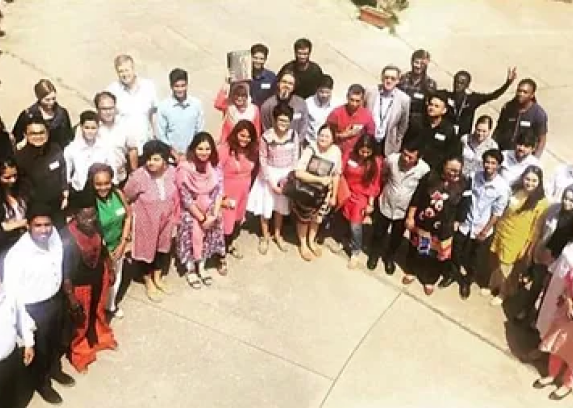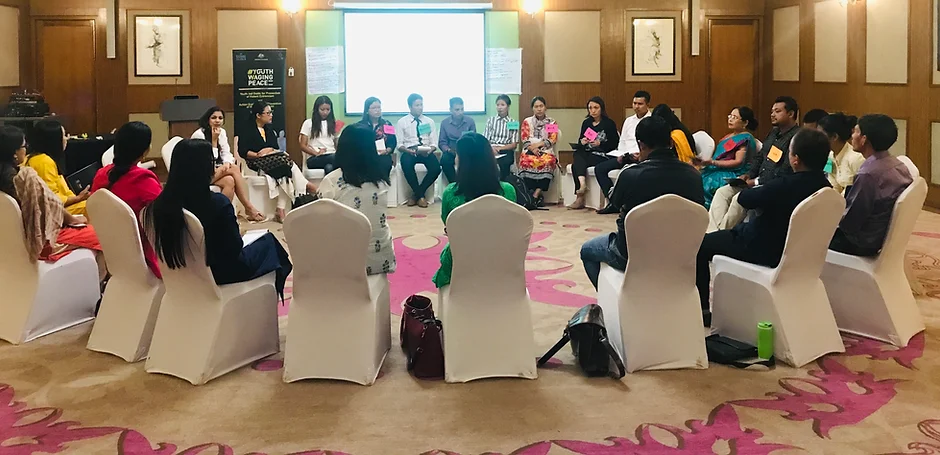
Our Founder, Anokhi Parikh, was one of the selected stakeholders for an intensive three days capacity-building workshop that will aim to train 25 young leaders from India and selected countries who will go on and train education stakeholders (teachers, parents, school administrators, religious leaders, policymakers, students and youth) in the area of prevention of violent extremism through education.
Social and Emotional Learning Capacity Building Workshop in Jammu & Kashmir in partnership with UNESCO MGIEP
Curriculum: Prevention of Violent Extremism through Education Curriclumn (Youth waging peace guidebook), EMCC concepts, DICE, CIT concepts and theory.
Workshop 1: 31 Oct- 1 Nov 2020 Workshop 2: 28-29 Nov 2020 In collaboration with UNESCO MGIEP’s Youth Waging Peace program, the main objective of the capacity-building workshop is to provide teachers from Jammu & Kashmir with the skills and tools for positive self and classroom transformation and for them to finally create an action plan collectively that they can take back to classrooms in Jammu and Kashmir. The goal is to equip teachers with the vocabulary to increase their own social emotional awareness, help process their own experiences in and out of the classroom and tune themselves better to the needs of the students.
The Manifesto was the capstone project for the UNESCO Mahatma Gandhi Institute of Education for Peace
and Sustainable Development (MGIEP)’s virtual capacity building workshop on Social Emotional Learning in
the classroom. You can find the link to the document below.
24 candidates were selected to attend the teacher training programme representing the districts of Srinagar, Shopian, Anantnag, Budgam, Baramulla, Pulwama, Bandipora in the Kashmir valley and Kathua and Rajaouri in Jammu. The diverse batch of participants from across the spectrum of age (27-50 years old) and gender, equally represented government and private schools.
The workshop was to build teacher’s social and emotional competencies to enable them to implement activities to build inclusive classroom and school spaces that do not affect students on the basis of religion, gender, race and caste in the context of Jammu & Kashmir’s socio-political realities.
Kashmir as we know continues to be a place of deep trauma resulting from political and civil unrest. Given the socio-political situation in the Union Territory state, educators can play a unique role to redirect youth angst and trauma towards dialogue and peace. Education’s unique capacity to transform society from the ground up is what makes it the most powerful tool to end violent extremism and inculcate a spirit of mutual respect, curiosity and self-reflection. In line with its vision of ‘Transforming Education for Humanity’, the UNESCO MGIEP’s programmes and products are designed to mainstream Social and Emotional Learning in education systems, innovate digital pedagogies and to put youth as global citizens at the centre of the 2030 agenda for Sustainable Development.
2000 students will be directly impacted by this virtual training through the educators who are now equipped to take social and emotional literacy into their classrooms and schools.
UNESCO MGIEP, along with partners in the region, is now establishing an on-ground network in Jammu and Kashmir to be able to build a more sustainable model in the region
UNESCO MGIEP focuses on achieving the UN Sustainable Development Goal 4.7 towards education for building peaceful and sustainable societies across the world by developing programmes that promote social and emotional learning, innovate digital pedagogies and empower the youth.

UNESCO’s action to prevent violent extremism through education (PVE-E) seeks to strengthen the capacities of national education systems (policies, teachers, and educational contents) to appropriately and effectively contribute to national prevention efforts. This includes equipping learners, of all ages, and notably young women and men, with the knowledge, values, attitudes and behavior, which foster responsible global citizenship, critical thinking, empathy and the ability to take action against violent extremism. For UNESCO MGIEP, it is specifically building the critical and social and emotional competencies of young men and women to wage peace.

The UNESCO MGIEP workshop in Manipur saw participants from the entire spectrum of the education system in the state. The diverse crew of 23 participants with ranging from the ages of 23 to 53, from small private schools, to large governmental schools, from all remote regions and unrepresented tribes. The workshop aimed at creating a platform for teachers to address concerns around inclusivity and intentional
dialogue in the classroom.